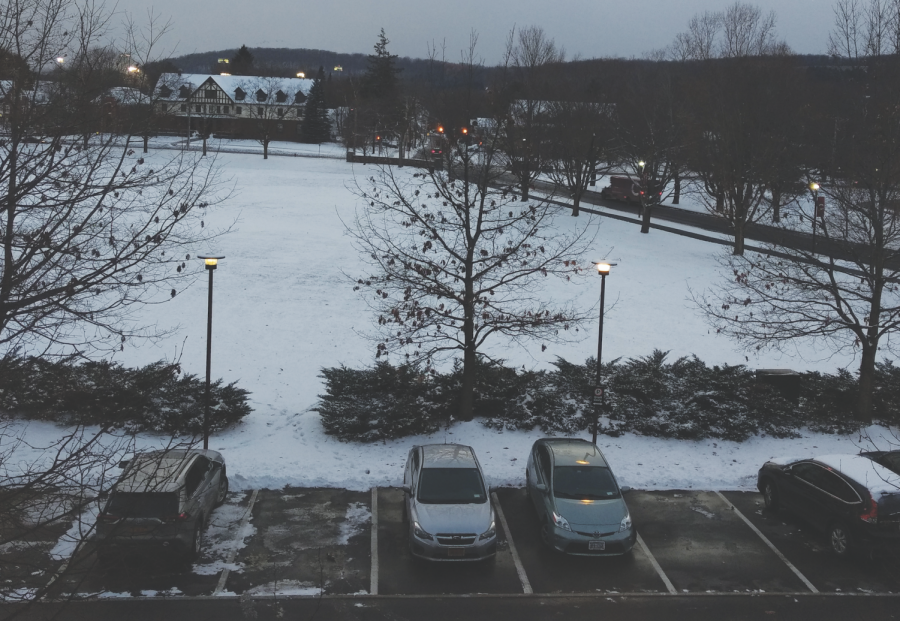Weather Decision Group Prepares Response to Severe Weather
Associate Vice President for Campus Safety, Environmental Health and Emergency Management Dan Gough addressed the Colgate community in a campus-wide email on Tuesday, November 5 regarding the impending severe weather and its potential impact on campus operations.
According to Gough’s email, the Weather Decision Group is initiated by Emergency Health and Safety (EHS) in the event of a significant weather-related event. Gough said the group existed well before his arrival in 2010 and the structure has remained largely the same.
According to Gough, the Weather Decision Group most commonly deals with winter snow and ice storms on campus, but has also addressed extreme cold and heat, flooding and tornadoes in the past. The group is designed to include specific roles from many campus departments, including Campus Safety, Facilities, Human Resources, Communications and Senior Administration. These roles include Senior Vice President for Finance and Administration, Provost and Dean of the Faculty, Chief of Staff, Vice President for Communications, Associate Vice President of Campus Safety, Environmental Health and Emergency Management, Associate Vice President of Human Resources, Director of Facilities Operations, Director of Media Relations and an EHS Duty Officer.
“The Weather Decision Group first considers the personal health and safety of the campus community and then reviews the status of roads, parking, pathways, and building accessibility. In addition, we ensure that all utilities are operational and consider how a delay or closure might impact services and planned events on campus, including the impact of class disruptions for course continuity and scheduling,” Gough said in the original email.
Gough said the purpose of the campus-wide email was to inform the community of the group’s decision-making process prior to the winter months, when the campus often experiences instances of severe weather.
“Winter weather in Central New York can be difficult at times and especially in the form of ice, snow, low temperatures, and high winds. It is important for the university community to understand our severe weather related decision making process and the careful considerations that guide these decisions. The Weather Decision Group’s number one consideration is the personal health and safety of the campus community,” Gough said.
Director of Facilities Operations and member of the Weather Decision Group Jason Wallace assesses the impact of severe weather on campus infrastructure and the capacity of the Facilities Department to address that impact. Wallace said the skills and commitment of the Facilities Department help ensure the safety of Colgate’s campus in instances of severe weather.
“The nature of severe weather is that it is unpredictable, so being prepared for every potential severe weather event is a challenge,” Wallace said. “The Facilities Department’s top priority is to always ensure the campus is as safe as possible, even in severe weather conditions. The weather can present numerous challenges, so having an extremely talented Facilities Team that is skilled, well trained and willing to go the extra mile is the best way to keep our campus safe.”
According to the email, the group communicates decisions to the campus at large via the ColgateAlert system in the event that they decide to delay or cancel any campus operations.
“[The system] distributes text and voicemail messages directly to individual cell phones. In addition, students, faculty, and staff receive emails about closures or delays, and information is also shared with local media and posted to the University’s website and official social media channels,” Gough’s email said. “Due to the number of times this group gathers to determine the University’s operating status, only closures and delays are shared via this alert system. If you do not receive an alert about a closing or delay, it is safe to assume that everything is operating as normal on campus.”
In response to the email, Sophomore Greta Ferdinand said she does not feel satisfied with the way Colgate generally deals with severe weather conditions.
“I don’t believe Colgate has made legitimate efforts for dealing with weather beyond the managing [of] extreme circumstances,” Ferdinand said. “Last winter, I could cite a handful of days when classes were not canceled, yet the weather was dangerously cold or the pathways and roads were dangerously icy.”
Media Relations Director for the Department of Communications Daniel DeVries said his role in the Weather Decision Group involves managing these communication efforts of the group’s decisions should they decide the weather will interfere with campus operations, as well as informing local media outlets of delays and cancellations impacting the campus.
“Because decisions are typically made very early in the morning, it’s important for weather updates be brief and concise so that the information can be shared quickly before employees get on the road to commute to work, and before students head out to attend early classes,” DeVries said.

Kirby Goodman is a senior from Minneapolis, Minnesota concentrating in peace and conflict studies with a minor in political science. She's previously served as...







